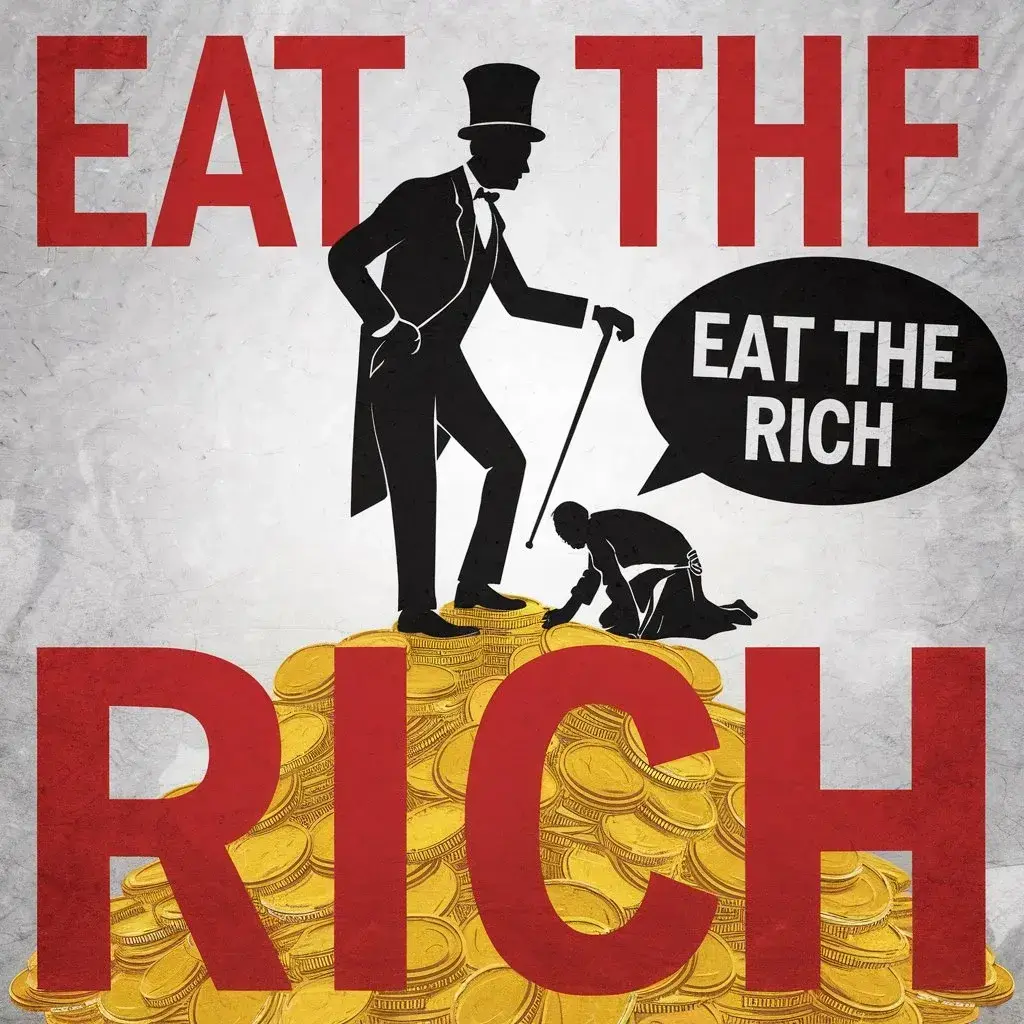Sayings and idioms are crucial elements of the English language that enrich our understanding of daily conversation. Sometimes, phrases like “eat the rich,” which may sound unusual or even humorous, can appear. It’s important to understand what they mean and how to use them appropriately.
The phrase “eat the rich” has sparked curiosity and debate for centuries. Rooted in the history of class struggle, it carries profound meanings tied to economic inequality and social justice. Though it originated during the French Revolution, the phrase remains relevant today as disparities between the wealthy and poor continue to grow. Understanding its history and usage can help us better grasp the frustrations of the underprivileged toward those who hold power and resources.
In this discussion, we’ll explore the meaning, context, and modern implications of this phrase.
What Does “Eat The Rich” Mean?
The phrase “eat the rich” is rooted in the idea that when poor people are pushed to the brink of survival, they will be forced to turn on the wealthy to sustain themselves. The full quote is: “when the people shall have nothing more to eat, they will eat the rich.” This doesn’t imply a literal consumption of people but suggests that if the wealthy hoard resources—whether it be money, food, or other necessities—the poor will eventually rise up to take back what they need, by force if necessary.
In essence, the phrase reflects a sense of inequality and the idea that extreme disparities in wealth and power could eventually lead to social revolt.
Who Qualifies As “The Rich”?
When discussing “the rich” in this context, it’s important to understand its historical background. The term originally referred to the aristocracy—those with land, titles, or connections to royalty during historical periods like the French Revolution.
In today’s context, however, “the rich” is more broadly defined. It includes people with substantial wealth and income, those who enjoy an extravagant lifestyle, and those who may accumulate wealth at the expense of others. They might not only hoard resources but also exhibit lavish spending habits while maintaining a tight grip on their wealth.
On the other hand, “the poor” generally refers to those who are less fortunate, often working-class or middle-class individuals struggling to make ends meet.
What Is The Origin Of “Eat The Rich”?
The phrase “when the people shall have nothing more to eat, they will eat the rich” is attributed to Jean-Jacques Rousseau, a leading figure during the French Revolution.
It emerged during a time of widespread famine in France, when grain prices were skyrocketing, creating a vast disparity between the rich and poor. The wealthy were largely unaffected, having access to food and other resources, while the poor were left to starve.
A major contributor to this famine was the manipulation of grain prices by wealthy individuals. Poor farmers had to sell their grain immediately after the harvest to get any money to support their families. Meanwhile, rich buyers would purchase the grain at low prices and hold onto it, waiting for its price to rise, after which they would sell it at a higher profit. This practice widened the divide between the classes: the rich had ample resources, and the poor had next to nothing.
The expression “eat the rich” thus became a symbolic phrase of rebellion against this kind of economic exploitation and social disparity. It represented the anger of the poor and their potential to rise up and seize what they needed to survive, whether that meant food, money, or power.
Examples of How to Use the Phrase
Although it’s an old-fashioned phrase, you might still encounter it in modern-day discussions, especially in political or social justice contexts. Here are some examples of how to use the phrase in sentences:
- “If you can’t afford anything nice from the shop, you could always eat the rich.”
- “Look at how they dress compared to us. The poor really do need to eat the rich.”
- “They’re always talking about eating the rich, but I don’t understand why. We give society all the money it needs!”
- “Tax the rich! Eat the rich! Make sure they don’t get away with their selfishness.”
- “You can’t eat the rich unless you’re willing to go toe-to-toe with them.”
- “Do you think I don’t want to eat the rich? I’ve been poor my whole life. It’s time I take a stand.”
- “Seriously, when are the poor going to rise to eat the rich? I’m sick of the growing divide in taxation and politics!”
- “If I could, I would eat the rich. They don’t deserve all that wealth.”
- Give me a call when you arrive.
- Can you give her a hand with that project?
- I’ll give you a ride to the airport.
- Please give your feedback on the proposal.
- It’s important to give your best effort in every task.
- They decided to give the gift at the party.
- Don’t forget to give him a shout on his birthday.
- Can you give me a minute to think about it?
- The teacher will give a lecture tomorrow.
- He wanted to give her a surprise for their anniversary.
- Please give your attention to the speaker.
- We need to give them some space to work.
- I’m happy to give you my support anytime.
- She decided to give back to the community through volunteering.
- Let’s give this idea a try before making a decision.
As these examples show, the phrase is typically used with a sense of anger or discontent toward the rich and often signifies a call for protest or uprising against social injustice.
Related Phrases
If you’re looking for related expressions that convey a similar message to “eat the rich”, there are a few modern and historical alternatives:
- Down with the aristocracy! This is another expression from the past, used to rally against the elite class or aristocracy. Like “eat the rich,” it called for the downfall of the upper class in the name of equality.
- Tax the rich. This is a more contemporary phrase, particularly popular in left-wing political rhetoric. While less aggressive than “eat the rich,” it carries the same idea of redistributing wealth by encouraging higher taxation on the wealthy to benefit the poor.
- Bridge the gap. This refers to efforts to reduce the economic divide between the rich and poor. It calls for more equity in wealth distribution, suggesting ways to lessen the disparity.
- Power to the people! This rallying cry emphasizes the importance of grassroots movements and democratic participation, advocating for the rights and power of ordinary citizens.
- No justice, no peace! This phrase has been used in protests to highlight that true peace cannot exist without social justice, calling for systemic change and equality.
- Workers of the world, unite! Originating from Marxist theory, this phrase encourages global solidarity among the working class against exploitation and oppression.
- Liberty, equality, fraternity! This motto from the French Revolution advocates for the fundamental principles of freedom, equality, and brotherhood in society.
- Tax the rich! A contemporary slogan calling for a more equitable tax system, aimed at addressing income inequality and funding social programs.
- We are the 99%! This phrase emerged from the Occupy Wall Street movement, highlighting the disparity between the wealthy elite and the majority of the population.
- No more silence! Often used in social justice movements, this phrase demands an end to silence around issues of oppression and inequality, urging people to speak out.
- Break the chains! This expression symbolizes the struggle against oppression and the desire for freedom from societal or systemic constraints.
- Justice for all! A call for fairness and equality in the legal system, emphasizing that everyone deserves equal treatment under the law.
- Rise up! A motivational phrase used in various movements to encourage people to take action against injustice and fight for their rights.
FAQs
What does “eat the rich” mean?
The phrase “eat the rich” is a metaphor that highlights the divide between the wealthy and the poor. It suggests that if the rich continue to hoard wealth and resources while others struggle, the poor may eventually rebel or take drastic measures to survive. The term emphasizes economic inequality and the idea that those without resources will rise against those who have plenty. It’s not about literal violence but more of a symbolic call for justice and redistribution.
Where did the phrase “eat the rich” come from?
The origin of the phrase can be traced back to Jean-Jacques Rousseau, a philosopher during the French Revolution. He famously said, “When the people shall have nothing more to eat, they will eat the rich,” reflecting the social conditions of that time. The phrase arose during a period of famine and economic disparity when the wealthy controlled resources, and the poor starved. It was used to express frustration with the aristocracy and a call for equality.
Is “eat the rich” still relevant today?
Yes, the phrase remains highly relevant in today’s society, especially in discussions about income inequality, corporate greed, and the wealth gap. Modern movements often use it to criticize billionaires and wealthy elites who are seen as benefiting from the labor of the working class while paying minimal taxes or wages. The phrase resonates in debates over tax reform, fair wages, and the ethical responsibility of the wealthy to contribute to the welfare of society.
Who qualifies as “the rich” in today’s context?
In modern times, “the rich” typically refers to those who hold significant financial wealth, assets, and influence. This could include billionaires, corporate executives, or individuals with vast amounts of capital and property. The phrase often targets those who benefit from a system of capitalism without sharing their wealth in a way that benefits society, such as by paying higher taxes or investing in social programs. The focus is on those whose wealth significantly exceeds that of the average citizen.
How can “eat the rich” be used in modern conversation?
The phrase is often used in discussions about social justice, politics, and economic reform. It’s typically employed in a figurative manner, meant to criticize the wealthy elite and call attention to the growing wealth divide. For example, in a conversation about corporate profits or tax evasion, someone might say, “Eat the rich!” to express their frustration with the system that allows such inequalities to exist. It’s a strong, symbolic statement used to push for change.
Are there any alternatives to using “eat the rich”?
Yes, there are many other phrases that convey similar meanings, but with varying degrees of intensity. For instance, people often say “tax the rich” to emphasize policy changes that could redistribute wealth through increased taxation on higher incomes. Another common phrase is “bridge the gap,” which advocates for narrowing the wealth gap between the rich and the poor. These alternatives tend to be more politically neutral and focused on solutions rather than just protest.
Conclusion
The phrase “eat the rich” symbolizes more than just a call for action; it represents a deep-rooted frustration with inequality and injustice. While its origins may date back to the French Revolution, its relevance continues today in discussions about wealth, power, and social justice. Whether used literally or figuratively, the phrase captures the rising tensions between rich and poor and serves as a reminder of the consequences of unchecked inequality.

It’s Elara Winters, your guide at “Grammer Grove.” I’ve dived into the intricacies of crafting the perfect English writing sections for your project, research paper, or thesis. With a wealth of experience in this field, I’m here to help you express gratitude and appreciation effectively. Join me on this journey, and let’s make your English writings shine!












